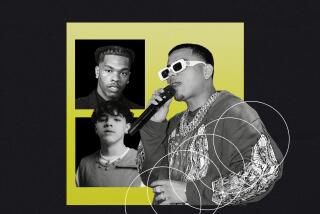
- Share via
Peso Pluma’s upcoming performance at the Viña del Mar Festival in Chile is stirring controversy as high-profile Chilean government officials, sociologists, and public television officials are challenging his headlining slot, saying his music condones narcoculture.
Festival organizers, however, are sticking with the Mexican singer, even as the board of Televisión Nacional de Chile (TVN) — the public television channel responsible for part of the management and transmission of the festival — has requested to cancel his participation, as reported by El País.
In a statement on Wednesday, festival organizers said Peso Pluma will remain in the lineup. They recognized his “international prestige,” and said there are no “legal or contractual arguments” to revoke his participation.
Peso Pluma, Ice Spice, J Balvin, Young Miko, Carin León, Kevin Kaarl, the Red Pears, Deftones and more will perform at Coachella 2024.
“His music, in addition to millions of listeners on all platforms, is also present on important stages, as he was just confirmed yesterday for Coachella, one of the three largest festivals in the world,” organizers said in a statement shared in an Instagram Story.
The Coachella Valley Music and Arts Festival lineup dropped on Tuesday, with Peso Pluma — who performed at Coachella in 2023 with Becky G — returning to the desert stage in April.
The Viña del Mar Festival is taking place from Feb. 25 to March 1 at the Quinta Vergara amphitheater, with a lineup that features Alejandro Sanz, Andrea Bocelli, Maná, Mora, Los Bunkers, and others.
Three banners emblazoned with alleged threats against Mexican singer Peso Pluma were discovered in Tijuana early Tuesday.
Peso Pluma is scheduled to perform the last day of the festival.
Among those publicly condemning Peso Pluma’s participation, is Juan Antonio Coloma, president of the Senate in Chile, who said his performance would be “a normalization of narcoculture in our country and it is unacceptable.”
“The country cannot remain indifferent. What would happen if a singer who raises xenophobia, homophobia?... There is no doubt that, with all reason, his performance would have been prevented, because it would mean normalizing a behavior. Why, then, is narcoculture normalized? “ he said.
El País journalist Antonia Laborde notes that Peso Pluma is not an artist who receives much media attention in Chile, but his lyrics, like those from Gavilán II — “A mí me gusta chambear/ Y si la orden es matar/ Esa no se cuestiona” — make some in Chilean society, particularly politicians, uncomfortable.

Minister of the Interior and Public Security of Chile Carolina Tohá has also expressed concerns about Peso Pluma’s participation, according to CNN Chile.
“As authorities committed to security, we are concerned that there is so much following of songs that promote narcoculture and that often also promote a quite derogatory view towards women and reproduce very discriminatory paradigms regarding sexism,” she was quoted saying.
In a Jan. 8 opinion column, sociologist Alberto Mayol wrote:
“Don’t forget, on March 1, on the screens of the state channel, we will hear the voice of the narco. It’s just so we can get used to it, I guess. But of course, no one wants to go against Peso Pluma because he is famous, because removing him from the festival could be contrary to electoral logic, because the young vote could be lost.”
Anthropologist Carla Pinochet and Laura Jordán, both researchers at Núcleo Milenio sobre Culturas Musicales y Sonoras, offer a different perspective in their article, “The Sins of Peso Pluma.”
“Removing Peso Pluma from the Viña Festival programming is not going to silence their songs or discourage narcoculture. Rather, it deprives us of the opportunity to listen to what is playing on the urban peripheries, and to offer channels for those urgent conversations that we have put off for too long,” they write.
More to Read
The Latinx experience chronicled
Get the Latinx Files newsletter for stories that capture the multitudes within our communities.
You may occasionally receive promotional content from the Los Angeles Times.










